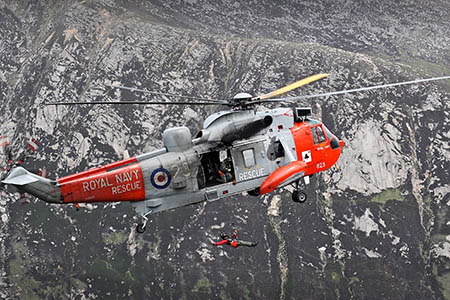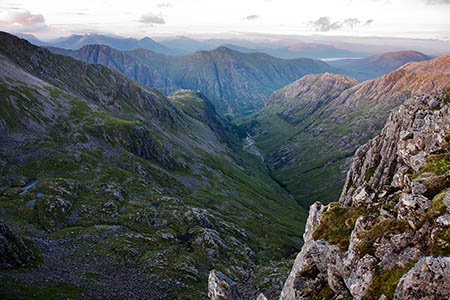Rescuers warned against the reliance on mobile phones after two walkers were airlifted from a Highland mountain after getting lost in fading light.
The pair had difficulty getting a phone signal which meant the crew of the Royal Navy Sea King were faced with searching a large area of Glencoe.
A Royal Navy spokesperson said the two men, in their late 20s and early 30s and from France, got hopelessly lost 600m (2,000ft) up in the Three Sisters area.
The spokesperson said: “Weak or non-existent mobile signal meant that, by the time they had managed to alert police to their plight, it was almost 10pm on Wednesday.
“Thereafter, because of lack of signal in the mountains, rescuers still were unable to dial into the mobile phones of either of them, and the only way the pair could continue to communicate with the authorities was by using the 999 emergency number to get messages passed through.”
Glencoe Mountain Rescue Team was alerted and the crew from HMS Gannet in Ayrshire took off to join the search.
Initial information from the lost pair was sketchy and rescuers were simply told they were missing somewhere in Glencoe. A subsequent communication told them that they thought they were somewhere south of the A82 as they could see lights from the road.
Lieutenant Commander Andy Drodge, HMS Gannet’s commanding officer and the aircraft observer on the rescue, said: “It wasn’t a lot to go on and it’s a big area.
“We arrived in the area at 11.30pm and it was what you might describe as dark dusk.
“Fortunately, it was a relatively clear night and the two walkers did have torches which they shone when they heard the aircraft, so we located them almost instantly.
“One of them was on a reasonably substantial ledge and the other was in a much more precarious position about 50ft above him on a small rocky outcrop.
“I put down our winchman, Lieutenant Commander Rob Suckling, to pick up the higher one first and we got him into the aircraft.
“A very light southerly breeze caused us problems with downdrafting and we were pulling very high power to maintain our hover.
“The relief of the second walker was clear to see when he ran towards Rob as he went down on the wire to pick him up.
“He too was recovered to the helicopter once he had calmed down enough for the strop to be fitted over his head and under his arms.”
The Royal Navy said both grateful men were delivered safely to the base of the mountains into the care of the mountain rescue teams and police at 12.03am on Thursday, before the Sea King returned to its Ayrshire base at 12.50am.
Lt Cdr Drodge said: “Neither of the men was injured, but they were tired, anxious and starting to get quite cold.
“Although we did find them quickly on this occasion, they hadn’t told anyone where they were going and what time to expect their return. If they had, the fact that they hadn’t returned would have been enough to alert the authorities much earlier.
“They had assumed they could just use their phones – obviously, and very fortunately, they did eventually get through, but they lost themselves still further in the process and wasted a lot of time, by which time we were well into the depths of night.
“Admittedly high summer is not the worst time to be stuck out on the hills, but, even at this time of year, there is a noticeable drop off in temperature at night, combined with altitude and the fact that walkers tend to be wearing more lightweight clothing, it is not ideal.
“While it can do no harm to have your mobile with you wherever you are, the remoteness of many of Scotland’s mountains means that you cannot rely on it necessarily if you get into trouble.
“As ever we would always recommend that walkers, regardless of how experienced they are, ensure that someone is aware of their planned movements for the day, as well as their predicted return time.”

